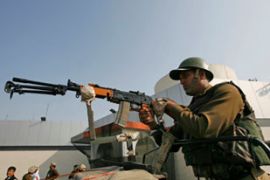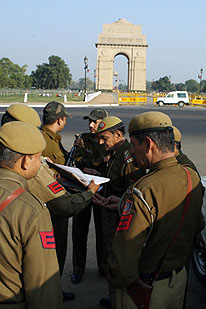Security scare at Indian airport
Reports of firing in Delhi add to jitters as Pakistani group denies link to Mumbai attacks.

At least 171 people were killed in the attacks and hundreds more injured.
‘Lying low’
India has said that nine attackers were killed and one captured alive, but US analysts believe there could have been more who escaped.
“I think there are more. My sources say [there were] at least 23 of the gunmen,” Farhana Ali, a former CIA and Rand Corp analyst and expert on fighter networks, said.
“If that’s true, that makes one wonder why we haven’t seen more attacks. Are they lying low?
| IN DEPTH |
 Retracing the attacks Video: Indian Muslim’s anger Pakistan-India ties in focus Why was Mumbai targeted? Timeline of Mumbai attack Voices from Mumbai Photos: A city under fire Map: Assault flashpoints Your Views on the assault |
“I think they [the Indian authorities] are bracing themselves for more.”
David Kilcullen, who has served as a senior adviser to David Petraeus, the US general now heading Centcom, and Condoleezza Rice, the US secretary of state, said he agreed that there were probably more attackers.
“The Indians said there were 10 attackers, based on the fact that they captured one and killed nine – you have to assume there are more out there,” he said.
Amid the speculation over the exact number of attackers, Indian newspapers said the Pakistan’s Inter-Services Intelligence (ISI), the Pakistani spy agency, was involved in training the men, who are said to belong to the Pakistan-based Lashkar-e-Taiba group that has been blamed for several attacks in India.
“The Inter-Services Intelligence connection was clear and evident,” the Times of India quoted Indian intelligence sources as saying.
The newspaper said investigations into the Mumbai attack had led to the names of handlers and trainers of the attackers and the locations where the training was held.
Ajmal Amir Kasab, the captured attacker, allegedly told interrogators he had been sent by Lashkar-e-Taiba and identified two of the plot’s masterminds, according to two Indian government officials familiar with the inquiry.
Indian operative
Kasab told police that one of them, Zaki-ur-Rehman Lakhvi, Lashkar’s operations chief, recruited him for the attack, and that the assailants called Yusuf Muzammil, another senior Lashkar figure, on a satellite phone after hijacking an Indian vessel en route to Mumbai.
The group behind the attack apparently used an Indian operative as far back as 2007 to scout targets for the elaborate plot against India’s financial capital, authorities said, a blow to Indian officials who have blamed the deadly attacks entirely on Pakistani groups.
 |
| India is still jittery following the Mumbai attacks [AFP] |
Faheem Ansari, an Indian national and alleged Kashkar operative, was arrested in February in north India carrying sketches of the hotels, train terminal and other sites that were later attacked in Mumbai, Amitabh Yash, director of the special task force of the Uttar Pradesh state police, said.
Pakistan has condemned the assault, denied any involvement by state agencies and vowed to help the Indian investigation, but it wants proof of Pakistani involvement.
The attacks have brought tension to ties between the nuclear-armed rivals and endangered a four-year-old peace process.
Condoleezza Rice was in both New Delhi and Islamabad this week, mediating between the two neighbours.
Asif Ali Zardari, Pakistan’s president, told Rice he had asked India to see this as a chance to work together rather than be at odds, saying: “I intend to do everything in my power”.
“The government will not only assist in investigations but also take strong action against any Pakistani elements found involved in the attack,” a statement quoted Zardari as saying.
Possible ‘torture’
In the wake of the attacks, the Jamaat-ud-Daawa, A Pakistani Islamic group, has denied having any ties with Laskhar-e-Taiba.
The group conducted a tour for journalists at its headquarters in the town of Muridki, which India says is a training centre for armed groups.
On Thursday, Indian police said there were signs that some of the six hostages held at a Jewish centre during the Mumbai attacks may have been tortured.
“The victims were strangled,” said Rakesh Maria, a senior Mumbai police official. “There were injuries noticed on the bodies that were not from firing.”
But members of an Israeli rescue group which had a team in Mumbai said it was impossible to tell if the bodies had been abused because no autopsies were conducted, in accordance with Jewish tradition.